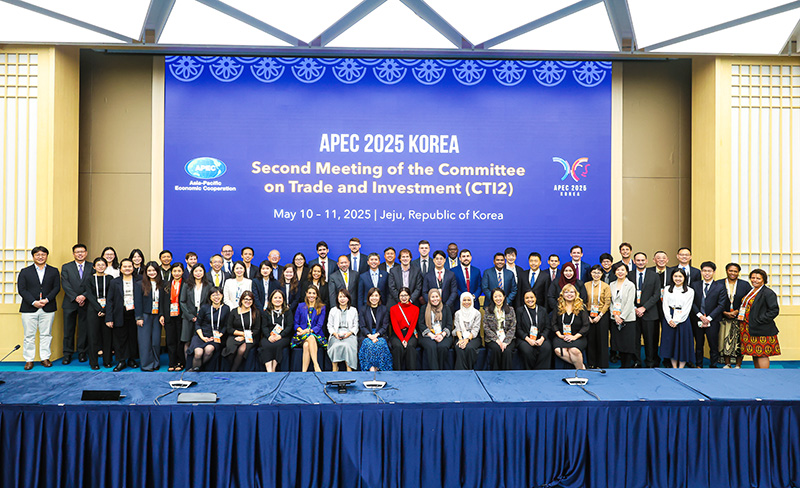
First Meeting of the Committee on Trade and Investment (CTI), 10 & 11 May 2025, Jeju Island, Gyeongju, Republic of Korea. For more photos, see https://www.flickr.com/photos/apec2025/
The Committee on Trade and Investment (CTI) was established in November 1993 by the Declaration of an APEC Trade and Investment Framework. APEC leaders and ministers direct its work and APEC senior officials provide guidance. The scope of the CTI’s work was expanded and further clarified by the Osaka Action Agenda (OAA) in 1995 and the Aotearoa Plan of Action (APA) in 2021.
The CTI is a forum for APEC’s 21 member economies to deliberate trade and policy issues. It meets three times a year on the margins of the senior officials’ meetings whom it reports to. It works to reduce impediments to business activity in the areas outlined by the OAA and promote trade and investment as stated in the APA, with the aim of helping APEC economies achieve free and open trade and investment while pursuing the Putrajaya Vision 2040. The objectives of CTI are to:
- Create a coherent APEC perspective and voice on global trade and investment issues and increase cooperation among members on key issues.
- Pursue opportunities to
- Liberalize and expand trade, facilitate a more open environment for investment and develop initiatives to improve the flow of goods, services, capital and technology within the region
- Consult on issues of importance on that context and develop consensus to expand and strengthen these flows within the region and globally
- Reduce and remove distortions which impede these flows
- Implement the 2023 San Francisco Principles on Integrating Inclusivity and Sustainability into Trade and Investment Policy which was agreed by APEC Economic Leaders at the 2023 APEC Economic Leaders’ Meeting
- Under the “Next Steps”, CTI will, among others, have a specific agenda item during CTI3 from 2024 to 2028 to share work on progressing the Principles
The CTI oversees eight sub-groups
- Business Mobility Group (BMG)
- Digital Economy Steering Group (DESG)
- Group on Services (GOS)
- Intellectual Property Rights Experts Group (IPEG)
- Investment Experts’ Group (IEG)
- Market Access Group (MAG)
- Sub-Committee on Standards and Conformance (SCSC)
- Sub-Committee on Customs Procedures (SCCP)
The CTI oversees two industry dialogues
The work of these APEC groups in 2024 can be found in the appendices of the 2024 CTI Report to APEC Ministers.
The summary record for past meetings can be found in the Meeting Document Database here. Select “Summary Records” > “Committees” > “Committee on Trade and Investment (CTI)”
In addition, the CTI has oversight of the following:
- APEC Cooperation Network on Green Supply Chain (GSCNET) (2023/SOM3/CTI/024)
- Asia-Pacific Model E-port Network (APMEN) (2024/SOM1/CTI/036)
- APEC Alliance on Supply Chain Connectivity (A2C2) (2024/SOM1/CTI/038)
Contacts
Ministry of Trade and Industry
Singapore
Program Director
Current Activities
CTI’s priorities and key activities
- Support for the multilateral trading system
- Advancing regional economic integration, including on the Free Trade Area of the Asia-Pacific Agenda
- Trade facilitation and strengthening connectivity and infrastructure
- Promoting innovative development and inclusive approaches
- Engagement with the business sector and industry dialogues.
An overview of the work of the CTI and its 10 subfora—the dialogues, initiatives and achievements made in 2024—are encapsulated in the 2024 CTI Annual Report to Ministers.
To view CTI work and activities, please visit the Meeting Document Database here. Select “APEC Group” > “Committees” > “Committee on Trade and Investment.”

